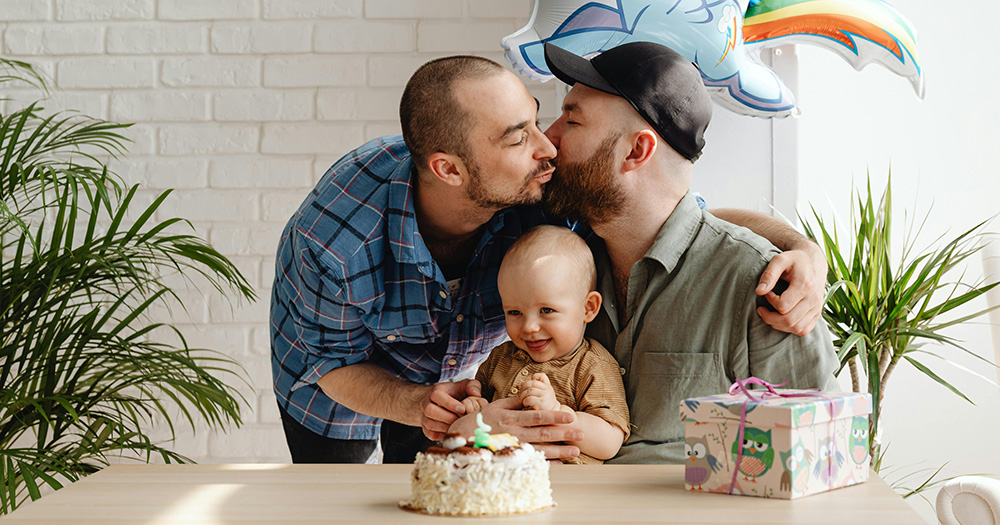Following the passing of the Assisted Human Reproduction (AHR) law earlier this year, Growing Families expert Dr Sam Everingham explains how the new legislation impacts LGBTQ+ parents.
What are the methods for starting a family for same-sex couples in Ireland?
Adoption options are now much rarer in Ireland than in the past. Instead, gay singles and couples tend to go down the route of either co-parenting with a good friend or surrogacy – mostly abroad with a small amount working with a surrogate in Ireland.
Are there any specific legal or logistical challenges that same-sex couples might face when pursuing family-building?
Apart from Canada and the US, most countries offering surrogacy to same-sex couples will list just one father on the birth certificate, along with the surrogate. Irish law has always recognised the biological father as a parent, once this is confirmed by DNA testing.
Logistically, for those engaging with a local surrogate, Irish IVF clinics are still not ready to take on such cases, so the embryo creation and transfer will usually be done offshore. Some countries such as the US, Canada and Argentina will grant the newborn a local passport, whereas, in jurisdictions like North Cyprus, Colombia and Mexico, the child cannot return to Ireland until an Irish travel document is processed.
What will Ireland’s Assisted Human Reproduction law mean for LGBTQ+ people in past and current surrogacy arrangements?
For same-sex Irish couples who have already completed surrogacy arrangements or are in a current arrangement, the new laws will mean the non-biological parent can make an application for a parental order. The couple need to be resident in Ireland, to provide all their surrogate’s contact details and to prove their surrogate was normally resident in the country she birthed in.
What will the new law mean for the future of surrogacy as a family-building pathway?
In an extraordinary development, once the new laws are enacted, these will criminalise engagement in commercial surrogacy, regardless of what country this occurs in.
Given the vast majority of surrogacy available globally provides compensation to surrogates, the new laws will decimate the options available. Irish citizens will thus only be able to engage in altruistic surrogacy. Such programs are only available in Ireland, Canada and it some cases the UK.
Future surrogacy arrangements will need to be pre-approved by a yet-to-be-established regulatory authority, based on the application of parents and a specific surrogate.
View this post on Instagram
How long is it before commercial surrogacy will be outlawed for Irish nationals?
This section of the Assisted Human Reproduction Act may be enacted in the next six months, although it is unknown when the new regulatory body will be established. As a result, some Irish surrogacy lawyers are advising that if you are considering this pathway internationally, it would be wise to commence this year, before these changes come into play.
Where should someone who wishes to start building a family through surrogacy or IVF start?
It is important to understand the complexities (legal, medical, psychological and logistical) by attending educational events such as those run by Growing Families on September 15. This year will be the last that such all-encompassing education on compensated and altruistic pathways will take place in Ireland, given by next year, Ireland’s new laws will outlaw most surrogacy arrangements.
What does Growing Families offer LGBTQ+ people wishing to build a family in Ireland?
We offer best practice advice on the current landscape, the pros and cons of particular pathways, education on surrogate matching, building relationships and budgeting. We offer advice on program costs to suit a range of budgets, as well as key differences in programs regarding who will appear on the birth certificate and what relationship you can expect with your surrogate.
We can support the LGBTQ+ community to work with a surrogate and donor in Ireland or abroad – this support can include practical advice, calculating expenses, setting expectations in altruistic arrangements, logistic issues, paperwork, connections with other parents and a range of donor and surrogacy options.
We also provide introductions to agencies, lawyers, IVF clinics and cryo-shippers who meet the ethical standards set by our International Advisory Board.
View this post on Instagram
To find out more about the impacts of the Assisted Human Reproduction Act, as well as family-building options for prospective parents, don’t miss Growing Families’ upcoming annual Surrogacy and Egg Donor Conference in Dublin on September 15.
© 2024 GCN (Gay Community News). All rights reserved.
This post is sponsored by Growing Families
Support GCN
GCN is a free, vital resource for Ireland’s LGBTQ+ community since 1988.
GCN is a trading name of National LGBT Federation CLG, a registered charity - Charity Number: 20034580.
GCN relies on the generous support of the community and allies to sustain the crucial work that we do. Producing GCN is costly, and, in an industry which has been hugely impacted by rising costs, we need your support to help sustain and grow this vital resource.
Supporting GCN for as little as €1.99 per month will help us continue our work as Ireland’s free, independent LGBTQ+ media.
